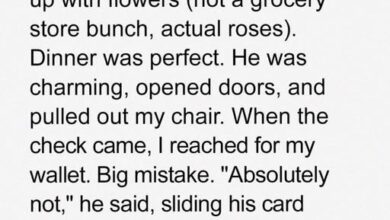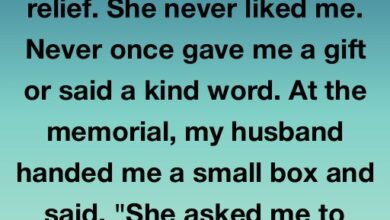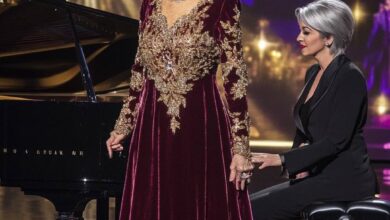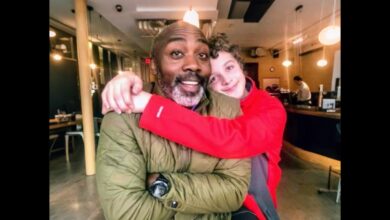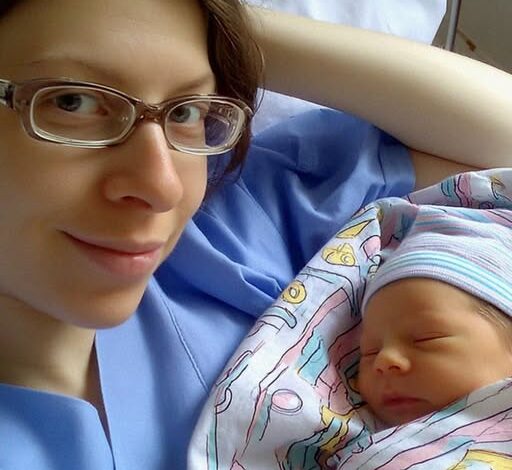
Lonely Mom Checks Baby in the Morning and Is Confused Seeing His Diaper Had Already Been Changed
“Get out!”
The scream hit first, then the shove. Kendall stumbled onto the porch with a backpack she didn’t pack and a heart pounding so hard it hurt. Behind her, the front door stayed half-open long enough for one last sentence to land like a slap.
“You’re a disgusting sinner. I won’t have you near your innocent brothers and sisters.”
She looked to her adoptive father for rescue. He wouldn’t meet her eyes. He came out a minute later with a crumpled roll of bills and a stiff apology that wasn’t really his: “Your sister grabbed a few things. I’m… sorry. You know how your mom is.”
“She’s not my mom,” Kendall said, voice raw. “And you’re not my dad if this is what ‘love no matter what’ looks like.”
He winced. The door clicked shut. The porch light snapped off.
Kendall walked until the streetlamps thinned and the park opened like a dark mouth. She sat on a cold bench, counted the money—fifty-six dollars and change—and understood it wouldn’t even buy a bed in a place that washed the sheets. Seventeen, pregnant, and homeless felt exactly as terrifying as you think it would.
She had grown up in a house where birthdays were “worldly,” Christmas was “sinful,” and joy came in tightly measured doses—if at all. There had been rules for everything and explanations for nothing. Naturally, she’d chased everything she was forbidden. Movies, makeup, a boy with a reputation and a smile that said, I know secrets.
The pregnancy test didn’t care about theology.
Kendall wiped her face with her sleeve and tried to breathe. She’d always had a private superstition: that somewhere out there was a guardian angel who saw her. On her birthdays, a small gift had appeared at school with no sender. At Christmas, when her family “fasted from idolatry,” a candy cane would be hooked onto the lowest branch of the tree outside her window, and once, a stocking filled with silly dollar-store treasures had appeared on her sill. She’d never told a soul. She’d never caught anyone in the act. It felt like being chosen in a life where she mostly felt confiscated.
Tonight, she told herself, angels are make-believe.
“Hey there, honey. What could be so bad?” The voice was warm, the kind people use on frightened dogs and children. Kendall looked up into a woman’s kind face framed by a messy bun and a floral apron. She held pruning shears in one hand, a clutch of roses in the other.
“It’s… nothing,” Kendall sniffed.
The woman sat anyway. “Looks like something. I’m Mila. I run the flower stand on the corner. I don’t judge, but I do listen.”
The whole ugly story poured out of Kendall—the yelling, the shove, the money that wouldn’t last a day, the small person growing inside her and the gigantic fear growing beside them both. When she stopped, Mila nodded like they were discussing weather.
“I’ve been wanting to open another stand closer to the business district. You can help me. I’ll teach you bouquets—color, balance, all of it. I’ve also got a little place you can stay for now. It’s small but clean. You will take care of that baby yourself, though. I don’t do diapers unless it’s an emergency.”
Kendall laughed, shocked to feel it bubble up. “Are you serious?”
“As frost,” Mila said, getting to her feet. “Come on. Morning comes early when you sell flowers.”
The apartment was exactly as promised: tiny, tidy, and safe. The next months blurred into early mornings, wet stems, and the green-stained fingers of someone learning a craft. Kendall found she could lose an hour building a bouquet that looked like a conversation—peonies soothing roses, eucalyptus whispering cool around everything. At the doctor’s office—Mila insisted, paid, and waited in the lobby—Kendall listened to the drumline of her baby’s heartbeat and cried into a stack of tissues.
She named him Michael when he arrived, a squirming, furious miracle with a swallow of dark hair. The first weeks were a country with no sleep. It felt like the clock shortened itself to ten-minute segments: feed, burp, change, sway, start again. One morning Kendall woke to sunlight thick on the floor and silence so complete it made her sit bolt upright.
Michael’s bottle was empty. His diaper was dry. He was asleep with his hands tucked under his chin like the cherubs in old paintings. “Did I…?” she whispered, trying to remember changing him in the fog of the night and coming up empty.
The second morning, it happened again. Bottle rinsed. Diaper fresh. Baby content. Relief battled unease. By the third night, Kendall made coffee at midnight and dared the hours to try her.
At three a.m., Michael fussed, then let out the small cry that spiraled up into distress if you didn’t catch it. Kendall padded to the doorway and froze. A woman stood over the crib, humming softly, moving with the efficient tenderness of someone who has done this a thousand times. She switched on the lamp, and the woman startled, then gathered Michael up, patting his back.
“Who are you?” Kendall demanded, adrenaline spiking. “Put my baby down.”
The woman turned, unafraid. Her eyes were wet. “Hello, Kendall,” she said. “I’m Martha Douglas. I’m your mother.”
The room tilted, then righted itself.
“I had you when I was sixteen,” Martha said, when the three of them were settled—Kendall on the edge of the bed, Martha in the rocker with Michael drowsing against her shoulder. “My mother told me to end the pregnancy. I said no. She kicked me out. I had no money and nowhere to go, and I believed adoption would give you what I couldn’t. It broke something in me that has never healed—but I did what I had to do to survive. I finished school. I started with a pushcart and a bucket and turned it into a chain of flower shops. Thirty-two now. It sounds impressive when I say it fast. It was mostly stubbornness and blisters.”
Kendall stared, trying to stitch the facts together. “The birthday gifts,” she whispered. “The Christmas stocking.”
Martha smiled, small and fierce. “I couldn’t be your mother on paper. So I was your mother in the margins. I watched from as far as I was allowed. I asked a friend—Mila—to watch from closer. When your family threw you out, she called me. I set the apartment up for you. I was going to come clean, but then I saw how hard Michael was on you. So I came in the night to give you sleep. Cowardly, I know. I just… wanted to help before I complicated everything.”
Kendall’s anger, already thin, dissolved. “Why didn’t you tell me sooner?”
“Shame,” Martha said simply. “I thought you’d look at me and see a girl who failed you. I thought you’d be right.”
Kendall stood and put her hands on Michael, one on his back, one on his heels—two points of contact like she needed them all tethered. “I would’ve given him up too if not for you and Mila,” she said. “You didn’t fail me. You found me. Angels don’t always have wings. Sometimes they have key cards and florist aprons.”
They moved in with Martha a month later. The house smelled like lemons and fresh-cut stems. Mila came over on Sundays with pastries and gossip, and together the three of them built a new kind of family that didn’t need anyone’s doctrine to make it real. Kendall went back to the flower stand part-time; she was good at it now, quick with a ribbon and gentler with herself. At night, when the house settled and Michael’s breathing turned to that soft whuffle babies do, she would stand in the doorway and think about all the ways people save each other without fanfare.
The Jordans never called. The money in the roll ran out long ago, replaced by paychecks and pride. Kendall sent photos to the return address she had memorized out of habit. Maybe they opened them; maybe they didn’t. She stopped waiting for miracles. She noticed instead how many small ones she was living inside.
When Michael turned one, he grinned with cake on his eyebrows, and Mila hooted, and Martha cried, and Kendall laughed until it felt like relief. Later, after everyone had gone to sleep, she stepped out onto the porch with her son balanced on her hip and looked up.
“Happy birthday,” she whispered to the night, to the years, to the girl on the park bench who had believed she was alone. “Look what we did.”
